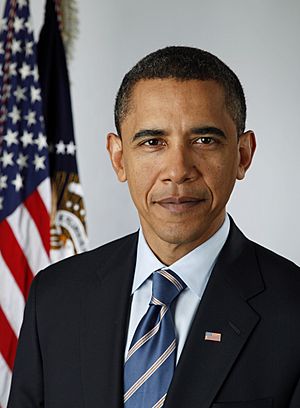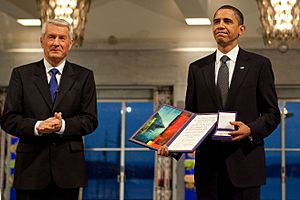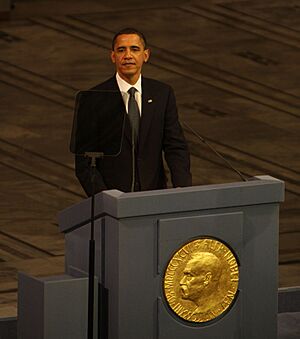2009 Nobel Peace Prize facts for kids
Quick facts for kids |
||||
|---|---|---|---|---|

"for his extraordinary efforts to strengthen international diplomacy and cooperation between peoples."
|
||||
| Presented by | Norwegian Nobel Committee | |||
| Date |
|
|||
| Location | Oslo, Norway | |||
| Reward | 10 million SEK ($1.5M) | |||
|
||||
The 2009 Nobel Peace Prize was given to United States President Barack Obama. He received the award for his "extraordinary efforts to strengthen international diplomacy and cooperation between peoples." The Norwegian Nobel Committee announced this on October 9, 2009. They praised Obama's work to stop the spread of nuclear weapons and for creating a "new climate" in global relations. This was especially noted in his efforts to connect with the Muslim world.
Obama accepted the prize in Oslo, Norway, on December 10, 2009. In his speech, he talked about the difficult balance between war and peace. He also spoke about the idea of a "just war." Obama mentioned that he was the leader of a country involved in two wars at the time. He is the fourth president of the United States to win the Nobel Peace Prize. The others were Theodore Roosevelt, Woodrow Wilson, and Jimmy Carter. Carter received his award after leaving office.
Contents
How the Prize is Chosen
The Nobel Committee chooses the winner from many nominations. These nominations come from committee members and other important people. For the 2009 award, nominations closed just 11 days after Obama became president. There were 205 nominations that year. Some of the people considered strong candidates included civil rights activists and politicians from different countries.
The Nobel Committee's Decision
The five members of the Nobel Committee are chosen by the Parliament of Norway. They usually represent the different political parties in Norway. The committee met several times in 2009. They chose Obama unanimously on October 5. The committee chairman, Thorbjørn Jagland, said they gave the prize for what Obama had already done. He hoped the award would help Obama's efforts in foreign policy.
Jagland mentioned that Obama's speech about Islam in Cairo in June 2009 was important. The committee also considered Obama's work to prevent nuclear proliferation and address climate change. They also liked his support for using international groups like the United Nations to achieve global goals. Jagland said that the "international climate" had improved, and Obama was the main reason.

Obama was the first U.S. president to receive the award during his first year in office. He had been president for about eight and a half months when he won. Other world leaders have also received the award early in their terms.
What People Thought About the Award
Many people were surprised when Obama won the Nobel Peace Prize.
Barack Obama's Reaction
Obama said he was "surprised" and "deeply humbled" to receive the award. He spoke at the White House Rose Garden on the day the prize was announced. Obama said he saw the award not as a recognition of his own achievements. Instead, he saw it as a sign of American leadership for what people in all nations hope for.
Obama explained that the Nobel Peace Prize is often used to support important causes. He said he would accept the award as a "call to action." This call was for all nations to work together on big challenges. These challenges included getting rid of nuclear weapons and stopping their spread. He also mentioned climate change, promoting understanding among different faiths and races, and achieving peace for Israelis and Palestinians. Obama also spoke about improving life for the world's poor. He said the U.S. was working to end one war and fight a dangerous enemy in another area.
He also said the award should be shared with everyone who works for fairness and respect. This included young women protesting for their rights and leaders fighting for democracy. It also included soldiers who serve far from home and people who risk their lives for peace. Obama announced that he would donate the prize money, about US$1.4 million, to charity. He gave large donations to housing and education organizations.
Reactions in the United States
Many people in the U.S. were surprised by the award. A poll showed that 61% of American adults thought Obama did not deserve the prize. However, 34% thought he did.
There was a lot of discussion and criticism about the Nobel Committee's decision. Some newspapers suggested the prize was a quiet criticism of the previous president, George W. Bush. They said that Obama's efforts to improve global relations were a big achievement. Other commentators felt the award was too early. Some even called it a "farce" or "ridiculous." They argued that Obama had not yet achieved enough to earn such a prestigious award. Some people even suggested that Obama should not accept the award.
Later, some Americans felt that Obama did not deserve the prize because of later events. Critics pointed to the increase in drone strikes under his presidency. In 2013, a petition was started asking the Nobel Committee to take back the Peace Prize.
Political Reactions
Former U.S. Vice President Al Gore, who also won a Nobel Prize, said the award was "extremely well deserved." Other politicians, like House Speaker Nancy Pelosi and Senator John McCain, congratulated Obama. However, some Republican leaders expressed disapproval.
In 2015, Geir Lundestad, who was the secretary for the Nobel Committee at the time, wrote a book. He said that giving Obama the prize to "give him a helping hand" was only partly successful. Lundestad mentioned that Obama himself was surprised by the award. He even thought about not going to Oslo to accept it. Lundestad also said that Obama had not lived up to the committee's hopes.
Reactions in Norway
A poll in Norway showed mixed opinions. 43% of Norwegians thought giving Obama the prize was right, while 38% thought it was wrong. Younger people were more likely to disapprove than older people.
Norwegian politicians also had different views. Prime Minister Jens Stoltenberg congratulated Obama. But opposition leaders felt the prize came too early. They thought the committee should have waited to see the results of Obama's actions. One far-left politician called the award a "scandal." He pointed out that Obama was the leader of a country involved in wars.
Other Global Reactions
Countries allied with the U.S. generally reacted positively. However, reactions from other parts of the world were mixed or negative.
Several other Nobel Peace Prize winners commented. Some praised the decision, seeing it as support for Obama's direction. Others, like Mairead Corrigan, were disappointed. She felt giving the award to the leader of a highly militarized country was wrong. Lech Wałęsa also said the award was too soon.
United Nations Secretary-General Ban Ki-moon praised the choice. He said Obama represented a new spirit of dialogue on global problems. French President Nicolas Sarkozy said the award would strengthen Obama's work for peace. Russian President Dmitry Medvedev hoped it would improve U.S.-Russian relations.
In Australia, a former Foreign Minister called the decision "gross stupidity." He blamed the committee for being too political.
In Asia and the Middle East, reactions varied. Afghan President Hamid Karzai said Obama was the "appropriate" winner. But a Taliban spokesman called the decision "ridiculous." He said Obama should have won a prize for "escalating violence." Japanese, Indian, and Israeli leaders sent congratulations. However, the Iranian Foreign Minister felt the decision was made too quickly.
In Latin America, former Cuban President Fidel Castro called the award "positive." He saw it as a criticism of past U.S. policies. Venezuelan Foreign Minister Nicolás Maduro also found the award surprising and possibly premature.
In Africa, the news was generally positive. Kenyan President Mwai Kibaki said the prize recognized Obama's contribution to humanity. South African President Jacob Zuma used the term Ubuntu (meaning "the importance of community") in his message. He said Obama's leadership showed a spirit of common humanity.
Obama's Nobel Speech
President Obama accepted the Nobel Peace Prize in person at the Oslo City Hall in Norway. This was on December 10, 2009. In his 36-minute speech, he talked about the challenges of war and peace. He also discussed the idea of a "just war." The speech included ideas from Reinhold Niebuhr, a philosopher Obama admired.
Many American commentators liked the speech. Some noted that Obama's message was similar to ideas from former President George W. Bush. However, others pointed out differences. Some prominent Republican politicians praised the speech.
To say that force is sometimes necessary is not a call to cynicism – it is a recognition of history; the imperfections of man and the limits of reason.
One former speechwriter for Jimmy Carter said the speech would be remembered by peacemakers in power. However, some critics found the speech uninspiring.
Newspapers like The New York Times praised the speech's clear language. They noted that Obama gave the speech he needed to give, even if it wasn't exactly what the Nobel committee expected. The Wall Street Journal also praised Obama for defending the need for war at times. It also liked his statement that evil exists in the world.
What Happened After
After receiving the prize, President Obama reduced the number of U.S. soldiers in Afghanistan and Iraq. However, he increased the use of unmanned air-strikes in these countries. He also used them in Pakistan, Yemen, Syria, Libya, and Somalia.
According to the Council on Foreign Relations, the United States military dropped a large percentage of all bombs in 2016. Obama was involved in military actions for longer than any other president in U.S. history.
In 2015, Geir Lundestad, the Nobel Committee secretary, said that giving Obama the prize did not achieve what the committee had hoped. He said that even many of Obama's supporters felt the prize was a mistake.
Images for kids
See also
 | Valerie Thomas |
 | Frederick McKinley Jones |
 | George Edward Alcorn Jr. |
 | Thomas Mensah |



